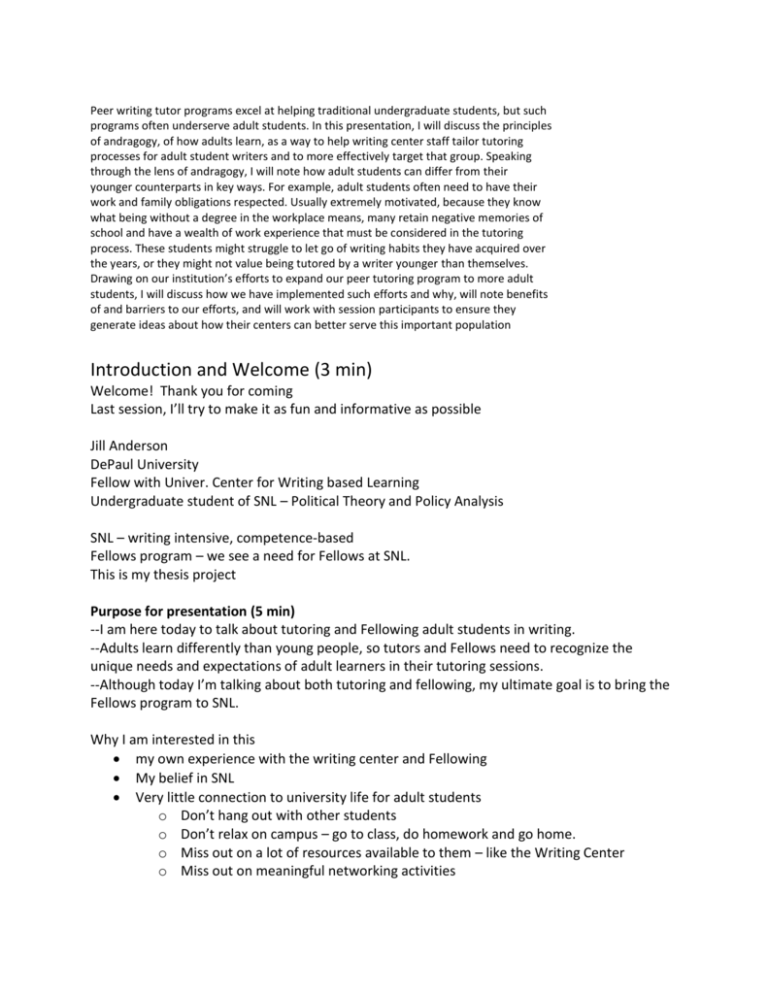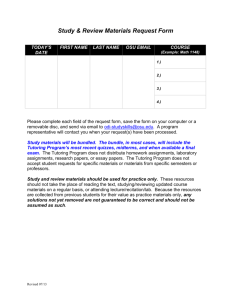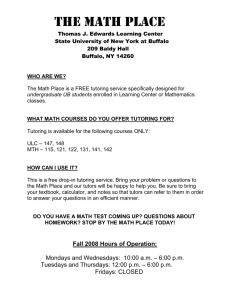here
advertisement

Peer writing tutor programs excel at helping traditional undergraduate students, but such programs often underserve adult students. In this presentation, I will discuss the principles of andragogy, of how adults learn, as a way to help writing center staff tailor tutoring processes for adult student writers and to more effectively target that group. Speaking through the lens of andragogy, I will note how adult students can differ from their younger counterparts in key ways. For example, adult students often need to have their work and family obligations respected. Usually extremely motivated, because they know what being without a degree in the workplace means, many retain negative memories of school and have a wealth of work experience that must be considered in the tutoring process. These students might struggle to let go of writing habits they have acquired over the years, or they might not value being tutored by a writer younger than themselves. Drawing on our institution’s efforts to expand our peer tutoring program to more adult students, I will discuss how we have implemented such efforts and why, will note benefits of and barriers to our efforts, and will work with session participants to ensure they generate ideas about how their centers can better serve this important population Introduction and Welcome (3 min) Welcome! Thank you for coming Last session, I’ll try to make it as fun and informative as possible Jill Anderson DePaul University Fellow with Univer. Center for Writing based Learning Undergraduate student of SNL – Political Theory and Policy Analysis SNL – writing intensive, competence-based Fellows program – we see a need for Fellows at SNL. This is my thesis project Purpose for presentation (5 min) --I am here today to talk about tutoring and Fellowing adult students in writing. --Adults learn differently than young people, so tutors and Fellows need to recognize the unique needs and expectations of adult learners in their tutoring sessions. --Although today I’m talking about both tutoring and fellowing, my ultimate goal is to bring the Fellows program to SNL. Why I am interested in this my own experience with the writing center and Fellowing My belief in SNL Very little connection to university life for adult students o Don’t hang out with other students o Don’t relax on campus – go to class, do homework and go home. o Miss out on a lot of resources available to them – like the Writing Center o Miss out on meaningful networking activities If we can create enculturation through the writing center and Fellowing, might lead to higher retention rates, better grades, a closer connection with the University as alumni That’s why I’m here…Why are you here? (5 min) Go around the room, introduce yourselves, talk about why you are here, what you want to get out of this presentation. What we will talk about Theory of Andragogy Characteristics of adult learners Self-Directed Learning 5 Step Model Strategies for practical application Implementation Trivia Exercise (5 min) Get you into the mindset of people who are not your age Remind you of all the things they can offer, all the knowledge they have, all they have lived through. So, now that we have oriented ourselves to being flexible, open-minded thinkers, we can continue talking about the characteristic of adult learners. Principles of Andragogy/Teaching Writing to Adult Students (15 min) What is Andragogy? The term was coined around the 1830s, but didn’t gain hold of public consciousness until Malcolm Knowles popularized the notion in the 1970s. He was first to chart the rise of adult learning in the US, and the first to attempt to create a theory of adult learning. Knowles held that there are five special characteristics of adult learners. 1.Self-concept Adult learners know that it is completely up to them to take the lead in their own learning. 2. Experience Because of their wealth of experiences, adults have the advantage of knowing what they don’t know. Many times younger students don’t know what they don’t know. That is both frightening and a great incentive to learn. 3. Readiness to learn With their multitude of experiences comes obligations and social situations that demand learning. Maybe it is a new hobby or sport they are picking up, a new challenge in the workplace, the arrival of a child, or working through relationship issues. Maybe they have a parent suffering from illness. Adults are ready to put themselves in the path of knowledge and, theoretically, have had a lot of practice doing so. 4. Orientation to learning This is the one I think is really interesting, and very applicable to thinking about the tutoring session. Adults – generally speaking - don’t have the luxury of engaging in abstract knowledge-seeking. They want information that is relevant and applicable. 5. Motivation to Learn This is another interesting point. Adults know what’s out there. They know what it is like to be without a degree. Whether it is a job that they weren’t qualified for, or a promotion that they were passed over for, adults going back for their degree have a very real sense of the stakes. Beyond that, adults might have a drive to finish their degree simply to attain a sense of accomplishment. It might be something that has bothered them for years, or something they felt guilty about. Knowles’ Slide – Self-Directed Learning Eric Moberg slide Knowles 3 Reasons for Self-Directed Learning --Proactive learners learn more, and better, then reactive learners --Self-Directed Learning is in sync with our natural psychological developmental processes --New education styles emphasize self-initiative and personal responsibility for learning Helping Students with Self-Directed Learning 1. diagnosing learning needs. 2. formulating learning needs. 3. identifying human material resources for learning. 4. choosing and implementing appropriate learning strategies. 5. evaluating learning outcomes. Informally at the DePaul Writing Center we recognize adult students as: Anxious – Age, Previous Failures Busy – Need flexibility, Clear Expectations, Respect for their time Motivated – Have set high standards of success for themselves, welcome criticism Experienced – Can be an asset, but old habits or beliefs can also get in the way of new learning How can we deal with these issues? Anxious – Find out about where the anxiety is coming from by asking students to tell you about their previous writing experiences and about how they go about writing a paper. Work to demystify writing for them by talking about your writing process, showing them how writing is hard even for experienced writers. Push them to write early and often, stressing that everyone needs to start with a lot of junk on the page before getting to the gold. Talk to them about revision as a process of discovering ideas as opposed to just fixing punctuation and word choice problems. Discuss writing as a skill everyone can learn to do as opposed to a gift given only to a few. Show them that there are many “tools” or “strategies,” they can learn to be more efficient and effective writers. This language helps to further demystify writing. Help students to identify and use what they already know. While these students lack confidence in their writing, they usually have a great deal of self-confidence in other areas of their lives because they have accomplished many things out in the “real world.” Often, students overanalyze a concept and think they “don’t get it” when in fact they do. Confirming that they do “get it” is a big boost for them. As much as possible, given the constraints of an assignment, help these students think about how they can use their knowledge and experience as a way into the assignment. Immediately discussing their strengths with them also instills confidence. Find out what they do consider themselves expert in and show how they can leverage that knowledge both for the content of a particular paper and to improve their writing. For example, I had a student who didn’t get the idea of revision until she saw the parallels to the trial and error process she used to play around with and improve recipes. Busy Help the student schedule face-to-face appointments in advance and be sure the student understands the turn-around times for feedback by email. Also mention that it may be difficult to schedule last minute face-to-face appointments during certain times, such as midterms and finals week. Agenda setting at the start and a discussion of next steps at the end of a tutorial. Clearly set the student’s expectations for what you will and will not be able to cover in any one session. If it is a first-time writing center appointment, make sure to explain what it feasible in one hour (or whatever time is scheduled). Under/overestimating how much you can accomplish with the student will leave the both of you confused and frustrated at the end of the session. Respect their limited time by using it most effectively. For example, if the student wants to talk about commas and you see a gaping hole in their argument, point out the argument issue and suggest they address that before the commas. Be discriminating in your use of the Socratic method to lead students to knowledge. Adult students do not have a lot of patience for what can seem to them like a game of twenty questions. Be explicit about what you are asking, why you are asking it and even the ways that they might structure a response. Experienced Help adult writers to see how they can leverage their experience in their writing. Show adult writers that college papers should not be a collection of “big words” about abstractions. If their paper is overly abstract and wordy, ask them to tell you what they want to say in the paper. Usually, they will be much clearer in their verbal presentation. Give them examples to help them see how they can narrow the focus of a paper so that it actually grapples with an idea or issue. Help adult writers to see business and academic writing as different genres. In particular, they often need help developing a rich sense of detail, the need to address objections and build support for claims, and the organizational conventions of academic papers. Discussing examples is a good way to help them refine the model of academic writing they are carrying around in their heads. The first time you go to the doctor’s office and discover that your doctor is about the age of your child, you will understand why adult writers can be initially reluctant to work with a younger tutor. Expressing your familiarity with SNL’s program and understanding that the student already has a lot of experience will make the student less concerned about age and more happy that you understand their position in the University/academia. It is also helpful to let students know if you have worked with other SNL students, business students, or graduate students—this makes them aware that you’re able to work with a broad range of students. Then, you can get right down to business. As soon as the student sees that you know what you are doing, the age difference between you will not be important. 3 situations (15 min) Busy, Experienced, Anxious, Motivated Identify which category(ies) these students fall into. Use your knowledge of the principles of andragogy as well as your own tutoring strategies to address each student’s needs. Really get into the psychology of each of these students. What are their backstories? Give them a history and personality. What makes them tick, and how are you going to tailor your session to meet their needs academically and emotionally? Brainstorming session on Implementation (15 minutes) Marketing – How are you going to convince adults to come into writing center? What materials will you use? Who are the people you will have to engage with? Measurement – How do you measure the success of adult students? Is this different than a measurement for traditional undergraduate students? What are the obstacles your writing center faces in reaching adult learners? How can you overcome these obstacles? Wrap Up (3 min) Thank you so much, hope this has been helpful to you. Wish you all the best in taking these ideas and putting them into practice at your institution Thanks for your patience – If you will notice, I have tried to put some of the principles to work here, and we have ended up doing a lot of self-directed learning today! Contact info Trivia Results and Prizes (5 min)



